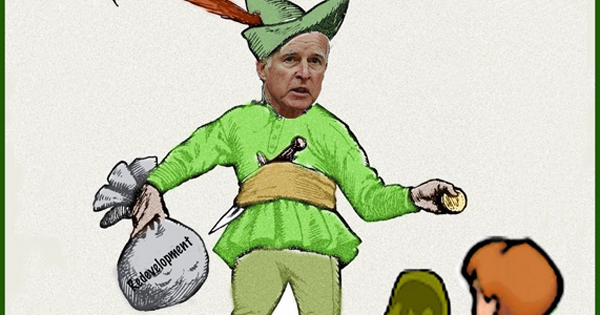More on the Demise of Redevelopment.
The Governor’s Proposed Budget for Fiscal Year 2012 (2011-12) was released on January 10, 2011. According to the Governor’s transmittal letter to the Legislature, he believes this budget “…proposes a far-reaching realignment of government functions by restoring to local government authority to make decisions that are best made closer to the people, not in Sacramento…envisions reorganizing state government to make it more efficient and save scarce tax dollars by consolidating or eliminating functions…focuses on the core functions of government and maintains essential services…[and] will make California government more transparent, efficient and responsive to the people.” He goes on to say that maintenance of essential services “…is…[most]…important…in our public schools, which have taken big cuts in recent years.”
While the message is admirable and the intended actions long overdue, they aren’t reflected in the reality of the budget itself. One of the ways Governor Brown intends to “restore local government authority” is to eliminate redevelopment across the State. The two concepts – restoring local control and eliminating redevelopment – are contradictory.
Redevelopment is one of the few remaining mechanisms by which property taxes paid by local property owners actually stay in our community; they are not first sent to the State and then a small percentage redistributed back to local municipal government. Tax Increment (TI), that amount of property taxes that increase as a direct result of the increased value from redevelopment projects in a designated area, accrue 100% back to local government, and are shared by the city, the school district, and other special districts, such as the Hayward Area Recreational District (HARD). No part of TI goes back to Sate government.
Under current law, property taxes are collected by local County government and distributed according to a complex and convoluted formula and set of laws. That distribution includes the majority beneficiary…state government. The local, municipal share varies with each city throughout California. Here in Hayward, our local city government gets 16% of every dollar paid in property taxes by property owners within the city limits. With TI, 100% of TI stays local, under the authority of local elected officials: City Council, Hayward Unified School District Board of Trustees, and the HARD Board of Directors.
So why the conflicting message from the Governor? There may be one or more reasons: financial, political, gamesmanship, or even ignorance. Whatever the Governor’s motivation, the elimination of redevelopment in California will have devastating effects on local government…certainly on the community of Hayward.
Using redevelopment funds and the associated program, the Hayward Redevelopment Agency, which is directly governed by the City Council sitting as the Agency Board of Directors, built one of the first Transit Oriented Developments, brought a renaissance to the Downtown Area, built a new school and adjacent multi-purpose park in the Burbank Area (Lower B Street), cleaned contaminated parcels and put them back into productive use, built award-winning affordable housing in the city, and generally removed blighted and rotting structures from prime land so that it could be productively and profitably reused. Redevelopment was responsible for providing some of the only existing construction jobs available in many locations throughout the state at that time.
The Governor’s stated intent of realigning government functions, making government more efficient and effective, and restoring local control over your tax dollars is welcome and necessary for responsive governance; and his quest for transparency is consistent with our own values here in Hayward. However, the proposal to eliminate Redevelopment within an impossibly short time frame is unfeasible, feels like desperate, reflexive, and chaotic decision-making; and appears to smack a bit of political retribution. At best, it is a ruse to funnel tax dollars to K-12 education without being transparent about his intention.

